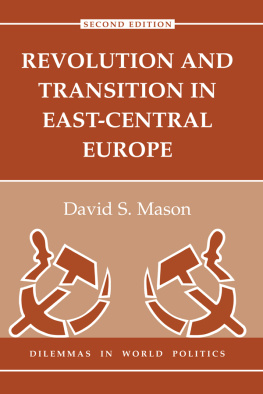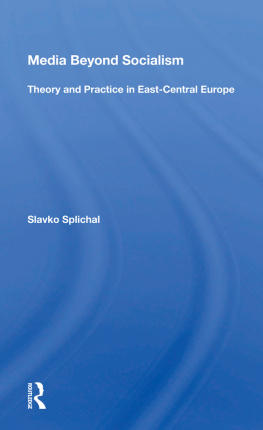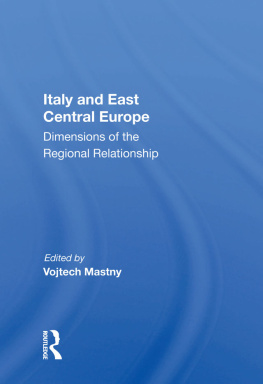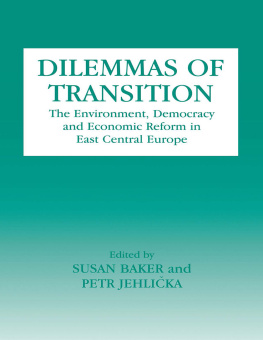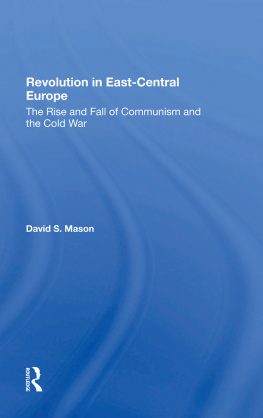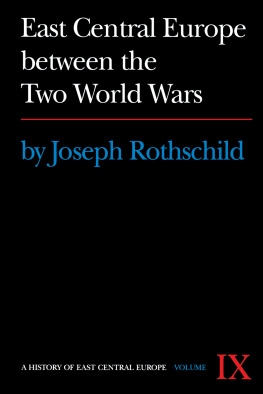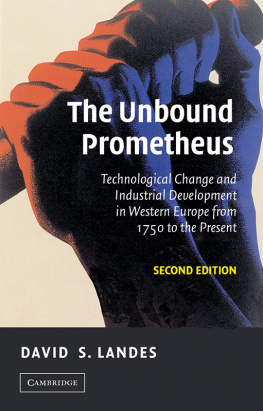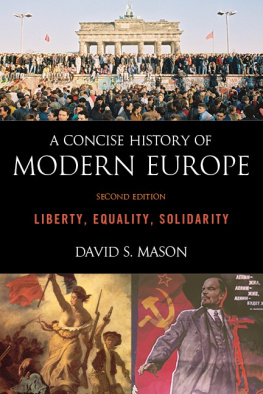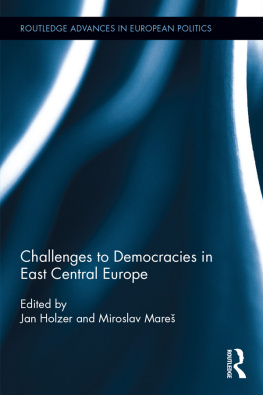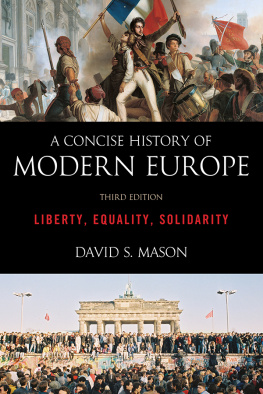Revolution and Transition in East-Central Europe
DILEMMAS IN WORLD POLITICS
Series Editor
George A. Lopez, University of Notre Dame
Dilemmas in World Politics offers teachers and students of international relations a series of quality books on critical issues, trends, and regions in international politics. Each text examines a real world dilemma and is structured to cover the historical, theoretical, practical, and projected dimensions of its subject.
EDITORIAL BOARD
Jeffrey Frieden
Harvard University
Deborah J. Gerner
University of Kansas
Vicki Golich
California State University-San Marcos
Lev Gonick
Wilfrid Laurier University
Barbara Welling Hall
Earlham College
Elizabeth C. Hanson
University of Connecticut
Barry Hughes
University of Denver
Janice Love
University of South Carolina
Vincent Mahler
Loyola of Chicago
Zeev Maoz
Tel Aviv University
Karen Mingst
University of Kentucky
Frederic Pearson
Wayne State University
V. Spike Peterson
University of Arizona
Neil Richardson
University of Wisconsin-Madison
Martin Rochester
University of Missouri-St. Louis
Georg S0rensen
Aarhus University (Denmark)
Harvey Starr
University of South Carolina
Michael Stohl
Purdue University
Douglas Stuart
Dickinson College
Donald Sylvan
Ohio State University
Sarah Tisch
Winrock International
John Vasquez
Vanderbilt University
FORTHCOMING TITLES
Thomas G. Weiss
Humanitarian Action, Intervention, and World Politics
James A. Caporaso
Challenges and Dilemmas of European Union
Janice Love
Southern Africa in World Politics
To my parents
Dilemmas in World Politics Series
First published 1996 by Westview Press
Published 2018 by Routledge
711 Third Avenue, New York, NY 10017, USA
2 Park Square, Milton Park, Abingdon, Oxon OX14 4RN
Routledge is an imprint of the Taylor & Francis Group, an informa business
Copyright 1992, 1996 Taylor & Francis
All rights reserved. No part of this book may be reprinted or reproduced or utilised in any form or by any electronic, mechanical, or other means, now known or hereafter invented, including photocopying and recording, or in any information storage or retrieval system, without permission in writing from the publishers.
Notice:
Product or corporate names may be trademarks or registered trademarks, and are used only for identification and explanation without intent to infringe.
Library of Congress Cataloging-in-Publication Data
Mason, David S. (David Stewart), 1947-
Revolution and transition in East-Central Europe / David S. Mason.
2nd ed.
p. cm. (Dilemmas in world politics)
Rev. and updated ed. of: Revolution in East-Central Europe. 1992.
ISBN 0-8133-2834-9 (hc). ISBN 0-8133-2835-7 (pbk.)
1. Europe, EasternPolitics and government1945- 2. Communism
Europe, Eastern. I. Mason, David S. (David Stewart), 1947-
Revolution in East-Central Europe. II. Title. III. Series.
DJK50.M38 1996
947dc20
96-24718
CIP
ISBN 13: 978-0-8133-2835-5 (pbk)
Soon after the first edition of this book appeared in 1992, Jennifer Knerr, my editor at Westview Press, asked me to start thinking about a second edition. This was both gratifying and dismaying. It was gratifying to know that the book was well received by professors and students but dismaying to think of wrestling once again with the difficult issues raised in a book I thought was finished! It turned out that revising and updating this book was almost as difficult and time consuming as starting from scratch with the first edition, given the enormous number of changes in the postcommunist states since 1992: the horrible escalation of the war in Bosnia; the 1993 crisis in Russia; the rapid consolidation of democratic institutions in Eastern Europe; the disturbing rise of poverty, crime, and inequality throughout the region; and the startling left turns in elections in Lithuania, Hungary, Poland, Russia, and elsewhere.
As with the first edition, though, I have tried to keep the book relatively simple in organization and relatively straightforward in presentation. For teachers who used the first edition, there are several changes that should be pointed out. A new on theories of social, economic, and political change. Almost all of that material still appears in the book, though each of the theories is farmed out to the sections and chapters to which it is most relevant.
Like any academic enterprise, this book benefited from the assistance, comments, and suggestions of many people. George Lopez, the series editor, first broached the idea of this book with me and got me hooked on the idea of a readable and accessible text that integrates history, politics, and theory. As I began writing the first edition, I had just finished teaching a course entitled Perestroika in Central Europe, and the book was in some ways an extension of that course. When I began to work on the second edition, I was teaching a freshman honors course entitled The Trauma of Transition in East-Central Europe. Students in both of those courses helped me to refine some of the ideas and concepts that are developed here. Lori Jancik, as my undergraduate research assistant, contributed enormously to the first edition in many ways: helping with bibliographic research; fact-checking; proofreading; and preparing the chronology. I am also indebted to Carla Randolph, a former Butler student who is now a Ph.D. candidate at Indiana University. She read and commented on an early version of the manuscript and helped me out with speedy and efficient research in Bloomington, which included digging up some of the political cartoons that appear in these pages. Because this book is intended for students, the comments of Lori, Carla, and others were particularly helpful. Marta Goertemiller and Donna Charles, our departmental secretaries, also helped out with the book in innumerable ways.
Jennifer Knerr, senior editor at Westview Press, was patient and encouraging in prodding this project along, with both editions. She found some wonderfully thorough and thoughtful readers in F. Neil Richardson and Robin Remington, who provided detailed and helpful criticism of the first draft of the book. The manuscript also benefited from suggestions from Gerhard Loewenberg of the University of Iowa, Luan Troxel of Smith College, Dan Nelson of Georgetown University, and Paul Marer at Indiana University. Of course I did not account for all of the suggestions of all of these friends and colleagues, so any remaining errors are entirely mine.
Finally, I want to thank the three women who are the most important part of my life. My wife and best friend, Sharon, read parts of the manuscript, talked me through some of the ideas and organization of the book, and put up with me when I was absorbed and distracted by this project. My daughters, Dana and Melanie, always full of life and (almost) always cheerful, provided perspective on all this and often asked questions about communism, world politics, and East-Central Europe that I could not easily answer. My fondest wish is that this new world that they will inherit will be more generous, charitable, and peaceful.

